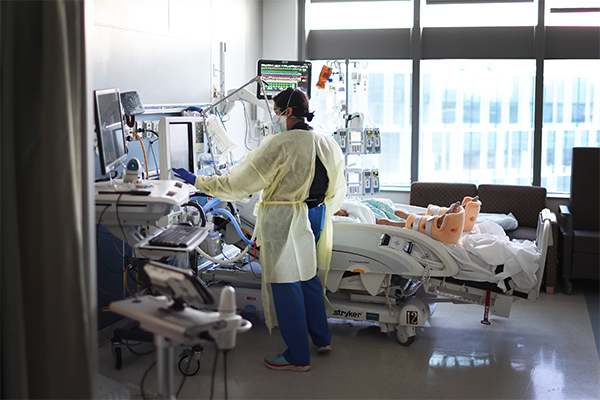Image: Hospitals accused of insurance fraud through excessive treatment, duplicate charges, and over-standard fees (Getty Images)
[People News] The National Healthcare Security Administration of China recently issued a statement highlighting severe violations discovered during inspections this year at seven designated medical institutions. These hospitals are suspected of defrauding the medical insurance fund of nearly 90 million RMB through practices such as excessive treatment, duplicate billing, and over-standard charges.
According to reports from Chinese state media, including CCTV, the hospitals involved in this case include Inner Mongolia Autonomous Region People's Hospital, Jiujiang First People's Hospital in Jiangxi Province, Changchun Traditional Chinese Medicine Hospital in Jilin Province, Shijiazhuang People's Hospital in Hebei Province, and Jinan Kidney Disease Hospital in Shandong Province, among others. Five of the seven are tertiary-level hospitals. The top three hospitals in terms of fraudulent amounts are: Inner Mongolia Autonomous Region People's Hospital: Found with 82 issues, involving 34.67 million RMB. Shijiazhuang People's Hospital in Hebei Province: Found with 86 issues, involving 20.01 million RMB. Changchun Traditional Chinese Medicine Hospital in Jilin Province: Found with 38 issues, involving 16.39 million RMB. The total amount involved across all institutions is nearly 90 million RMB.
Excessive Treatments and Meaningless Tests
The National Healthcare Security Administration pointed out that several hospitals profited from unnecessary medical examinations. For example: Shijiazhuang People's Hospital conducted sex hormone tests on more than 2,500 patients over the age of 60, tests typically relevant only for diagnosing puberty development or pregnancy and of almost no clinical value in this context. Inner Mongolia Autonomous Region People's Hospital repeatedly tested patients for "glycated hemoglobin" and "C-reactive protein" during a single hospital stay, wasting medical resources. The Affiliated Hospital of Gansu Medical College performed kidney function tests, including β2-microglobulin and cystatin C, on nearly 100,000 patients without kidney disease risk, which lacked any clear medical basis.
Zhengzhou resident Ms. Jia shared her perspective in an interview on Monday: "Nine million RMB? That’s just a drop in the bucket, and this involves several tertiary hospitals. The actual fraudulent amounts are far greater. Go to any hospital, and they’ll hand you a thick stack of test orders without asking any questions. This is a widespread issue in China. The fact that the authorities are releasing this information means the problem has reached an alarming level. Every hospital is like this."
Ms. Jia also recounted her father’s experience in the healthcare system three years ago: "We felt it firsthand when my father was hospitalized. They gave us an entire stack of test orders right away, making us go through every test. Later, when we transferred him to another hospital, they made us repeat all the tests. The problem is the excessive and unnecessary testing. The reported nine million RMB? That’s nothing—it’s just a tiny fraction."
Hospitals Inflate Costs, Increasing Patient Burdens
Duplicate charges are another widespread issue. For instance: Jiujiang First People's Hospital in Jiangxi Province was found to repeatedly charge for procedures such as spinal cord release and decompression surgery, which should have been included in the cost of spinal fusion implant surgeries. The National Healthcare Security Administration likened this practice to a computer repair service charging not only for the repair itself but also for turning on the computer and logging in. Similarly, Changchun Traditional Chinese Medicine Hospital in Jilin Province repeatedly charged for "tracheal intubation" during general anesthesia, further burdening patients financially.
Ms. Wang, a resident of Changchun, shared her frustration: "Medical examinations have become routine. The moment you enter a hospital, they give you an all-encompassing set of tests. Whether those tests are necessary or not is something only they know, but you can’t refuse them—or they won’t treat you. Their primary goal is to collect testing fees, and those fees are a bottomless pit."
Charging for "Small Bottled Water" at "Barrel Prices"
Hospitals were also found to overcharge by applying higher-than-necessary standards for fees. Shijiazhuang People's Hospital in Hebei Province was accused of overcharging by applying "major dressing change" fees for minimally invasive surgeries with small wounds. This practice was compared to buying a small bottle of mineral water but being charged as if purchasing a barrel of water. Similarly, Inner Mongolia Autonomous Region People's Hospital billed patients based on the number of consumables used rather than the wound size for dressing treatments, resulting in patients paying significantly more than necessary.
Mr. Zhao, a resident of Chifeng, expressed his frustration: "The entire society seems to be obsessed with amassing wealth. Various institutions—training centers, hospitals, and others—are all engaged in this frenzy to collect money. We are still hoping for the day when universal free healthcare becomes a reality."
Hospitals Repeat Offenses Despite Investigations
The recent revelations have sparked widespread public outrage, with many netizens condemning practices like excessive treatment and duplicate charges. One netizen from Zhejiang commented: "A single CT machine generates 100 million RMB in revenue annually—patients are sent for scans first and given medication later." Another pointed out: "Many patients who only need two days of hospitalization are made to stay for four days. The first two days are wasted doing nothing, just to drain funds from medical insurance."
(Source: Radio Free Asia)









News magazine bootstrap themes!
I like this themes, fast loading and look profesional
Thank you Carlos!
You're welcome!
Please support me with give positive rating!
Yes Sure!